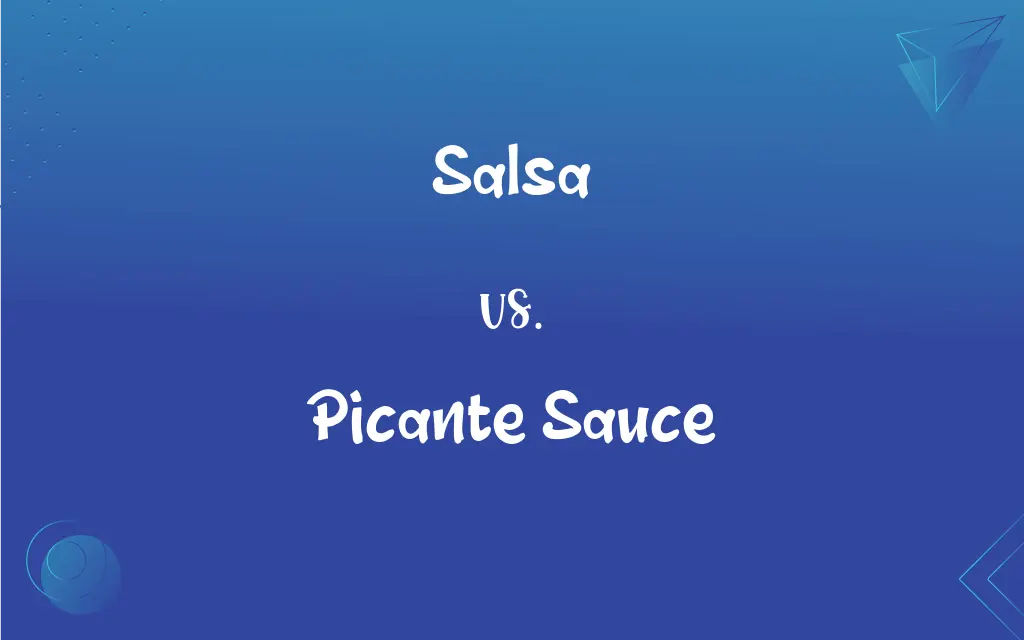Salsa vs. Picante Sauce: What's the Difference?
Edited by Aimie Carlson || By Harlon Moss || Updated on June 1, 2024
Salsa is a chunky mixture of fresh ingredients, while picante sauce is a smoother, spicier sauce primarily made from puréed tomatoes and peppers.

Key Differences
Salsa is chunkier, comprising fresh or cooked ingredients like tomatoes, onions, peppers, and cilantro. It's often used as a topping for dishes like tacos or served as a dip with chips. On the other hand, picante sauce, which translates to "spicy sauce," tends to have a more liquid consistency.
Picante sauce usually contains puréed tomatoes and peppers, making it smoother than salsa. It can range from mild to very spicy, depending on the type and amount of peppers used. While salsa can also be spicy, its heat levels are generally more varied and can be tailored based on the ingredients added.
Regions and personal preferences can influence the definitions and uses of both salsa and picante sauce. For instance, in some places, the distinction between the two might not be as pronounced. However, in general terms, salsa has a more diverse range of textures and flavors, while picante sauce is known for its smooth texture and spiciness.
It's worth noting that both salsa and picante sauce are integral to various dishes in Latin cuisine. Both can be homemade or store-bought, and their popularity has spread globally, with many variations adapted to cater to local tastes.
Comparison Chart
Texture
Chunky
Smooth
ADVERTISEMENT
Main Ingredients
Tomatoes, onions, peppers, cilantro
Puréed tomatoes, peppers
Spiciness
Can vary from mild to spicy
Typically spicy
Preparation
Fresh or cooked ingredients
Usually cooked and puréed
Use
Topping for dishes, dip for chips
Commonly used as a sauce or dip
Salsa and Picante Sauce Definitions
Salsa
A Latin American condiment used as a topping or dip.
Chips and salsa are a popular snack at parties.
ADVERTISEMENT
Picante Sauce
A sauce that ranges in spiciness levels.
The restaurant offers picante sauce in mild, medium, and hot.
Salsa
A genre of Latin American music characterized by its rhythmic beats.
She enjoys listening to salsa music while cooking.
Picante Sauce
A spicy sauce made from puréed tomatoes and peppers.
He added some picante sauce to his burrito for extra kick.
Salsa
A chunky mixture of fresh vegetables and herbs.
She topped her taco with a generous amount of salsa.
Picante Sauce
A popular condiment in Latin cuisine.
He always has a bottle of picante sauce in his fridge.
Salsa
A dance style rooted in Cuban rhythms and movements.
They danced the salsa all night long.
Picante Sauce
A smoother alternative to chunky salsas.
She prefers picante sauce over traditional salsa with her nachos.
Salsa
A spicy sauce made primarily of tomatoes, onions, and peppers.
She made a mild salsa for the children.
Picante Sauce
A liquid consistency sauce, often used for dipping.
Chips dipped in picante sauce are a spicy treat.
Salsa
A spicy sauce of chopped, usually uncooked vegetables or fruit, especially tomatoes, onions, and chili peppers, used as a condiment.
Salsa
A genre of Latin American music characterized by Afro-Caribbean rhythms, Cuban big-band arrangements, and elements of jazz and rock.
FAQs
How does picante sauce differ from salsa in texture?
Picante sauce is smoother, while salsa is chunkier.
What does "salsa" mean in Spanish?
"Salsa" means "sauce" in Spanish.
Can you use fresh ingredients in salsa?
Yes, salsa can be made from fresh or cooked ingredients.
Which has a more liquid consistency, salsa or picante sauce?
Picante sauce generally has a more liquid consistency.
Which is more versatile, salsa or picante sauce?
Salsa, due to its range of textures and flavors.
Do both salsa and picante sauce contain garlic?
They can, but it depends on the recipe.
Which is hotter: salsa or picante sauce?
It varies, but picante sauce is generally spicier.
Can salsa be used as a dip for chips?
Yes, salsa is often used as a dip for tortilla chips.
Is picante sauce always spicy?
Typically, picante sauce is spicy, but the heat level can vary.
What gives picante sauce its smooth texture?
It's made from puréed tomatoes and peppers.
Can you make salsa without tomatoes?
Yes, there are variations like mango or pineapple salsa without tomatoes.
Is salsa only used in Mexican cuisine?
No, salsa is used in various Latin American cuisines.
Can you buy picante sauce at the store?
Yes, many stores carry bottled picante sauce.
What are common ingredients in salsa?
Tomatoes, onions, peppers, and cilantro are common in salsa.
Can you use picante sauce as a base for cooking?
Yes, picante sauce can be used in various dishes as a base.
Are there fruit-based salsas?
Yes, like mango or pineapple salsa.
How long can homemade salsa last in the fridge?
About a week, but it's best when fresh.
Can you use picante sauce in marinades?
Yes, it can add a spicy kick to marinades.
Which has more variations, salsa or picante sauce?
Salsa, given its diverse range of ingredients and textures.
Is picante sauce typically refrigerated after opening?
Yes, it's advisable to refrigerate after opening.
About Author
Written by
Harlon MossHarlon is a seasoned quality moderator and accomplished content writer for Difference Wiki. An alumnus of the prestigious University of California, he earned his degree in Computer Science. Leveraging his academic background, Harlon brings a meticulous and informed perspective to his work, ensuring content accuracy and excellence.
Edited by
Aimie CarlsonAimie Carlson, holding a master's degree in English literature, is a fervent English language enthusiast. She lends her writing talents to Difference Wiki, a prominent website that specializes in comparisons, offering readers insightful analyses that both captivate and inform.
































































